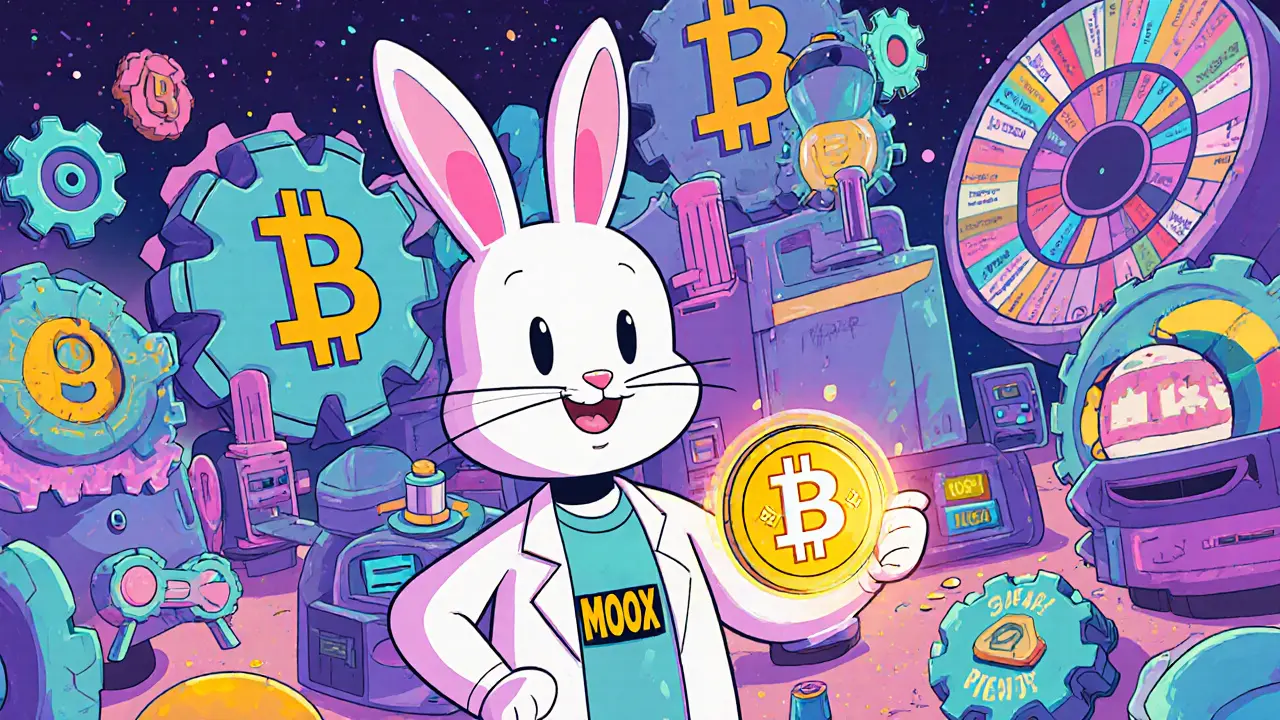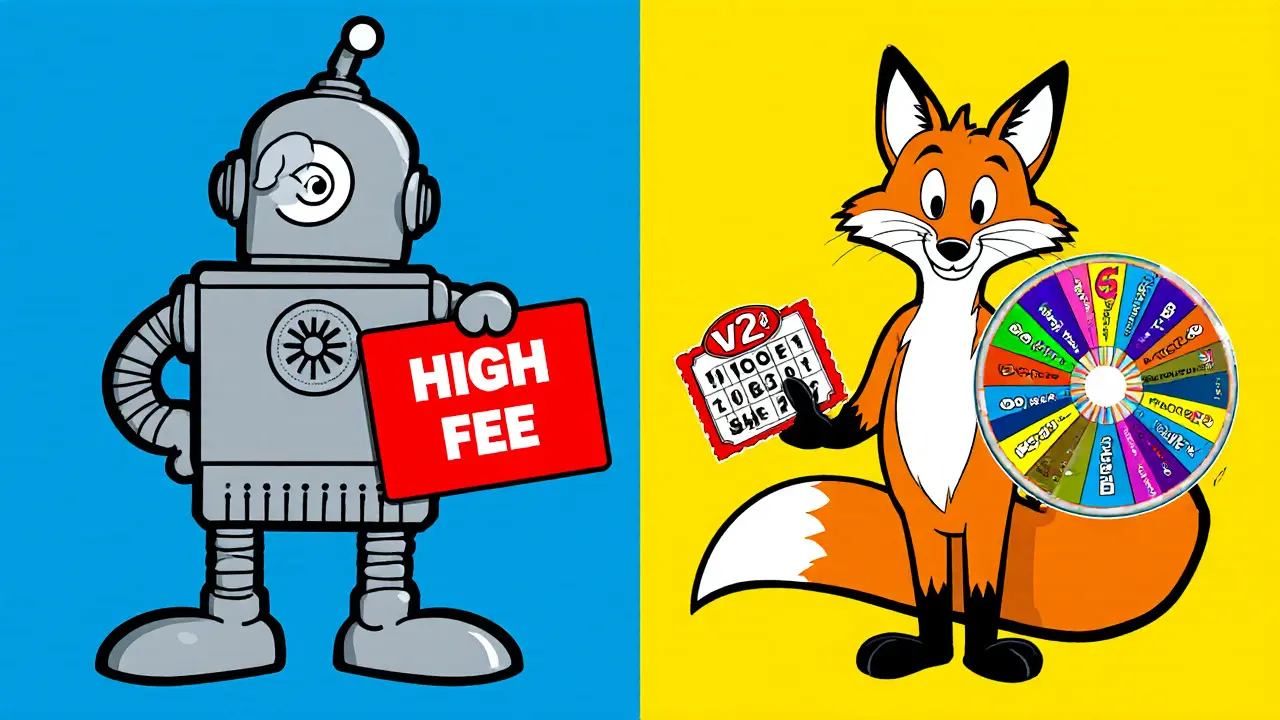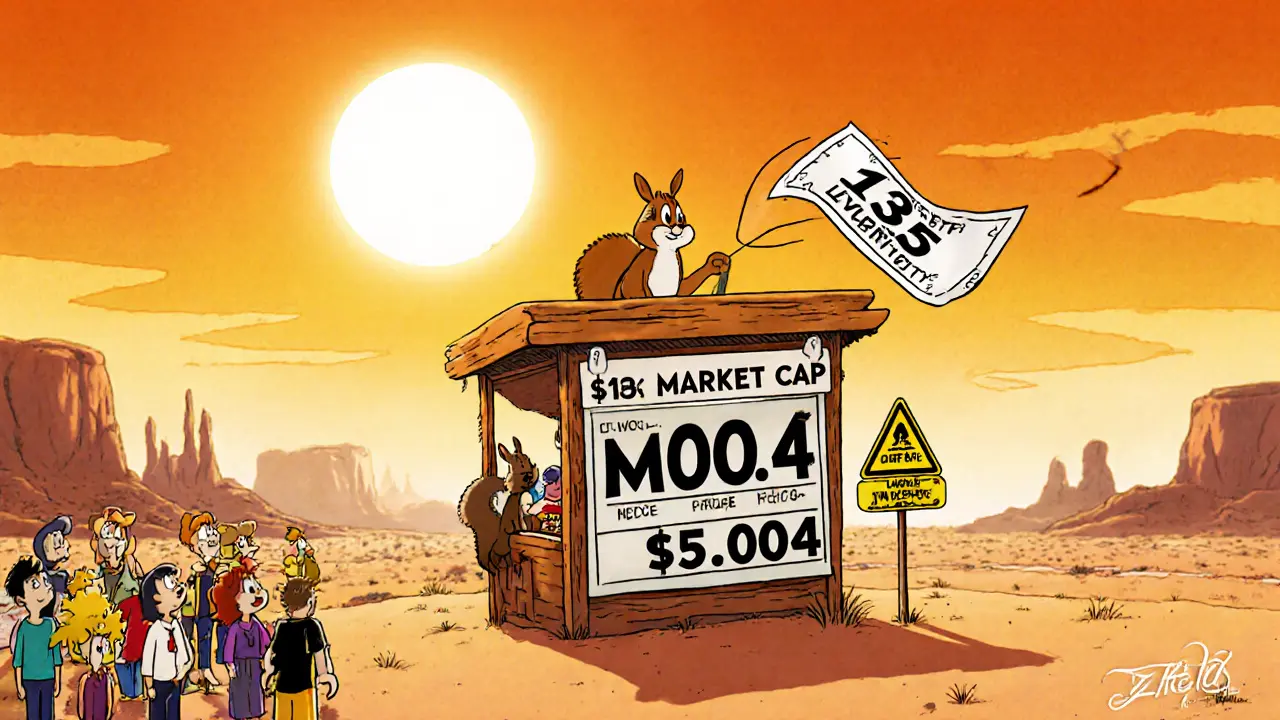
MOOX Token Comparison Tool
MOOX Token Overview
This tool compares the key differences between MOOX v1 and v2 tokens and explains how to migrate between them.
MOOX v1 vs. v2 Feature Comparison
Migration Process
To migrate from MOOX v1 to v2:
- Connect your BSC-compatible wallet (MetaMask, Trust Wallet, etc.)
- Go to moox.one/swap
- Approve the 1:1 swap transaction
- Confirm the transaction on your wallet
The process is reversible — you can always migrate back to v1.
Current Market Snapshot
Market Cap: ~$13,600 | Holders: 135 | 24h Volume: $10
Migration Status
You can safely swap between v1 and v2 tokens using the official portal.
No hidden fees or gas refunds involved.
Moox Protocol is a niche DeFi platform that lives on the Binance Smart Chain (BSC) and powers the MOOX cryptocurrency. If you’ve ever wondered what makes this token different-or whether it’s worth a glance-this guide breaks everything down in plain English.
What is Moox Protocol?
Moox Protocol is a decentralized finance ecosystem built on the BNB Smart Chain (BEP20). Its core mission is to combine three classic DeFi functions-liquidity provision, staking, and a built‑in lottery-into a single smart‑contract suite. The protocol launched in 2023 and has since iterated from an original token (v1) to a revamped version (v2) that aims to fix the earlier design flaws.
Token Evolution: MOOX v1 vs. MOOX v2
The original MOOX token suffered from a rebase mechanism that caused unpredictable supply changes and a hard‑coded sell fee that many users found too steep. To remedy this, the team introduced MOOX (v2), a wrapper token that removes the rebase, lowers transaction fees, and adds new utilities.
| Feature | MOOX v1 | MOOX v2 |
|---|---|---|
| Supply mechanism | Rebase (dynamic) | Fixed total supply |
| Sell fee | High (hard‑coded) | Reduced, transparent |
| Lottery | Basic | Fully decentralized, auto‑draw |
| Staking options | Standard LP staking | Enhanced MOOX‑only staking |
| Migration | Not applicable | Swap portal at moox.one/swap (1:1 ratio) |
Holders of v1 can migrate to v2 (and back) using the official swap portal. The process is straightforward: connect a BSC‑compatible wallet, approve the transfer, and confirm the 1:1 swap. No gas refunds or hidden fees are reported.
Technical Specs You Should Know
- Chain: BNB Smart Chain (BEP20)
- Total supply: 2.93million MOOX (both v1 and v2 share this figure)
- Circulating supply: 2.93million (self‑reported)
- Key contracts: Liquidity‑free provision, LP token staking, lottery smart contract, staking contract
Because the token lives on BSC, gas fees are typically a few cents, making everyday interactions cheap.

How to Interact with MOOX
- Set up a BSC‑compatible wallet (MetaMask, Trust Wallet, etc.).
- Add the BSC network if it isn’t already configured.
- Visit the official Swap portal at moox.one/swap to migrate between token versions.
- Provide liquidity on supported DEXs (e.g., PancakeSwap) to earn the tax‑free liquidity rewards.
- Stake MOOX in the protocol’s staking contract to capture the advertised yield.
- Participate in the automated lottery; each stake generates tickets proportionally.
All actions require a small BNB balance for gas. The platform’s UI is minimal, so a bit of patience helps if you’re new to DeFi.
Market Snapshot (as of 11Oct2025)
Current pricing is modest. Across three major venues the price hovers around $0.004USD per MOOX:
- CoinMarketCap: $0.004465 (24‑h volume $10.10)
- Binance: $0.004439 (down 0.33% in 24h)
- Crypto.com: $0.004192 (down 1.40% in 24h)
Market capitalization stands at roughly $13,600, with a fully diluted valuation near $23,200. Only 135 token holders are recorded, meaning liquidity is extremely thin. The 24‑hour volume of $10 signals that most trades happen on low‑traffic DEX pools rather than on major exchanges.
Strengths, Weaknesses, and Risk Profile
Every crypto project has trade‑offs. Below is a concise rundown for MOOX.
| Aspect | Details |
|---|---|
| Strengths | Low transaction fees on BSC; integrated lottery adds gamified incentive; tax‑free liquidity provision. |
| Weaknesses | Very low market cap and holder count; negligible liquidity; absent from major exchanges like Coinbase or Kraken. |
| Opportunities | Potential listings on niche DEX aggregators; community‑driven marketing could boost user base. |
| Threats | High price impact for any trade; risk of abandonment if development stalls; possible regulatory scrutiny due to lottery component. |
From an investment standpoint, the token sits well below the $100K market‑cap threshold that most analysts consider the minimum for sustainable projects. The thin volume also means that even modest buy‑or‑sell actions can swing the price dramatically.

Is MOOX Worth Your Time?
If you’re a DeFi explorer who loves experimenting with lottery‑driven yield, MOOX offers a sandbox to try out staking and LP rewards without heavy gas costs. However, for anyone seeking reliable liquidity, robust community support, or reputable exchange listings, the token falls short. Treat it as a curiosity rather than a core portfolio holding.
Key Takeaways
- Moox Protocol is a BSC‑based DeFi suite that bundles staking, liquidity provision, and a decentralized lottery.
- MOOX v2 replaces the original rebase token, delivering fixed supply and lower fees.
- Market data shows a $13K market cap, $10 daily volume, and only 135 holders - indicating extremely low liquidity.
- Interaction requires a BSC wallet, a small BNB gas budget, and use of the official swap portal for version migration.
- High risk due to limited adoption; best suited for experimental DeFi users rather than serious investors.
Frequently Asked Questions
What chain does MOOX run on?
BNB Smart Chain (BEP20) is the underlying blockchain for both MOOX v1 and v2.
How can I swap from MOOX v1 to v2?
Visit the official Swap portal at moox.one/swap, connect a BSC wallet, approve the transaction, and confirm the 1:1 swap. The process is reversible.
Is there a fee for staking MOOX?
Staking itself is fee‑free; only the usual BNB gas cost applies when you deposit or withdraw from the staking contract.
Can I buy MOOX on major exchanges?
No. MOOX is not listed on mainstream platforms such as Coinbase or Kraken. Trading is limited to Binance’s peer‑to‑peer market or decentralized exchanges on BSC.
What are the main risks of holding MOOX?
The primary risks are near‑zero liquidity (making entry/exit costly), a tiny holder community (raising the chance of abandonment), and regulatory uncertainty around the built‑in lottery.

Emily Kondrk
October 11, 2025 AT 08:00Yo, have you ever wondered why the whole DeFi moon‑shot scene feels like a secret cabal whispering in shadowy chat rooms?
Moox’s swap portal is touted as “safe”, but every 1:1 migration is a potential backdoor for whales to pump the token while the rest of us scramble for crumbs.
The lottery mechanic? Just another glittering distraction, a digital lottery that feeds the dopamine‑addicts and keeps us glued to the screen.
And don’t get me started on the rebase drama-it's the perfect smokescreen for hidden token‑omics manipulations that only the “insiders” understand.
In a world where BSC gas fees are pennies, the real cost is your sanity, as you watch your tiny holdings evaporate in a sea of anonymous bots.
Stay vigilant, question the “official” channels, and remember: the only thing more volatile than MOOX’s price is the conspiratorial narrative surrounding it.
Laura Myers
October 11, 2025 AT 19:06Alright, let’s cut to the chase-MOOX might look cute on paper, but its liquidity is basically a whisper in a hurricane.
The swap is straightforward, yet the whole thing feels like a high‑school drama where everyone’s fighting for the spotlight.
If you’re hoping for a juicy yield, you’ll need more than a few BNB for gas and a lot of patience.
Bottom line: treat it like a side‑quest, not a main storyline.
Leo McCloskey
October 12, 2025 AT 06:13The project is a shallow, over‑hyped, poorly‑backed, token‑mirage, fraught with empty promises, and offers nothing beyond buzzword‑filled nonsense.
Carol Fisher
October 12, 2025 AT 17:20America’s tech should lead, not hide behind obscure BSC token gimmicks like MOOX 🚀🇺🇸.
Skip the fluff and back real American innovation instead 💪.
Melanie Birt
October 13, 2025 AT 04:26If you’re looking to actually move your assets from MOOX v1 to v2, the process is as simple as a few clicks on the official swap portal.
First, make sure your wallet is BSC‑compatible and funded with a tiny amount of BNB for gas.
Connect the wallet, approve the contract, and confirm the 1:1 swap – the UI will display the exact amount you’re exchanging.
Because the token supply is fixed in v2, you won’t experience the erratic rebase behavior that plagued the original version.
The reduced, transparent transaction fee means you pay a predictable percentage rather than a mysterious high‑penalty levy.
Staking on v2 also benefits from an exclusive MOOX‑only pool, which offers higher APR compared to the generic LP pool used in v1.
When you stake, the contract automatically generates lottery tickets proportional to your stake, giving you a chance at the decentralized draw.
All of this runs on Binance Smart Chain, so gas costs remain in the realm of a few cents, keeping everyday interactions cheap.
However, the market depth is practically non‑existent, with daily volume hovering around ten dollars, so any sizable trade will move the price dramatically.
Liquidity is confined to small DEX pools, so be prepared for slippage if you try to dump or accumulate large amounts.
From a risk perspective, the thin holder base-just over a hundred addresses-means the project could easily be abandoned if development stalls.
Regulatory scrutiny is another factor, as the built‑in lottery may attract attention from agencies wary of gambling elements in crypto.
That said, the protocol’s integrated staking and lottery can be fun for DeFi explorers who enjoy gamified yield.
Just remember to keep a modest amount of BNB on hand for transaction fees, and never lock up more than you’re willing to lose.
If you do decide to participate, regularly check the official site for updates, as the team occasionally rolls out new incentives.
Overall, treat MOOX as an experimental sandbox rather than a core portfolio holding.
Scott Hall
October 13, 2025 AT 15:33Hey folks, just a heads‑up: if you’re dabbling with MOOX, keep your expectations low and enjoy the low‑cost gas on BSC.
It’s a neat way to test staking mechanics without burning a hole in your wallet.
Stay chill and have fun experimenting.
Jade Hibbert
October 14, 2025 AT 02:40Wow, MOOX is sooo big u know? Like, who even cares abt a token with $10 volume.
Sure, the lottery is cute, but it's just a fancy way to say "you might win nothing".
Good luck, I guess.
Leynda Jeane Erwin
October 14, 2025 AT 13:46In accordance with standard DeFi due diligence, it is advisable to review the smart contract audit reports prior to any interaction.
That said, feel free to hop onto the swap portal and give it a whirl-just don’t expect miracles.
Brandon Salemi
October 15, 2025 AT 00:53Ready to jump in? The swap is a breeze! Just click, confirm, and you’re done.
Enjoy the thrill of low‑fee staking and watch those tickets roll in.
Ben Parker
October 15, 2025 AT 12:00FYI, the MOOX token isn’t listed on any major exchange 😅, so you’ll be using DEXs only 🔧.
Daron Stenvold
October 15, 2025 AT 23:06Esteemed community members, consider the inherent volatility of a token with such limited liquidity before allocating capital.
The allure of a decentralized lottery may captivate, yet the underlying economic fundamentals remain fragile.
Proceed with caution and maintain a diversified portfolio.
ചഞ്ചൽ അനസൂയ
October 16, 2025 AT 10:13Bro, think of MOOX like a tiny river in a desert-it's moving, but you might run out of water fast.
If you’re just curious, dip a toe, but don’t try to cross the whole thing without a backup plan.
Orlando Lucas
October 16, 2025 AT 21:20From a systems‑thinking viewpoint, MOOX attempts to fuse staking, liquidity, and lottery into a single feedback loop.
Such integration can create emergent incentives, but also amplifies systemic risk if any component falters.
Optimistically, the reduced fees in v2 could attract a niche community of gamers‑turned‑investors.
Conversely, the thin market depth means price discovery is prone to manipulation.
Ultimately, treat this as an experimental micro‑economy rather than a stable asset.
Philip Smart
October 17, 2025 AT 08:26Honestly, MOOX is just another meme token trying to ride the DeFi hype train.
Jacob Moore
October 17, 2025 AT 19:33Pro tip: always keep a small stash of BNB in your wallet for gas; otherwise you’ll be stuck at the swap screen waiting for funds.
Manas Patil
October 18, 2025 AT 06:40In the broader Indian crypto ecosystem, projects like MOOX showcase the innovative spirit of decentralized finance, even if they’re still in their infancy.
The blend of staking yields and gamified lottery reflects a unique cultural appetite for risk‑adjusted rewards.
Annie McCullough
October 18, 2025 AT 17:46yeah i get why people hype it but dont think it’s gonna change anything :/
Lady Celeste
October 19, 2025 AT 04:53Another overhyped token, zero substance.